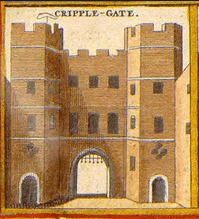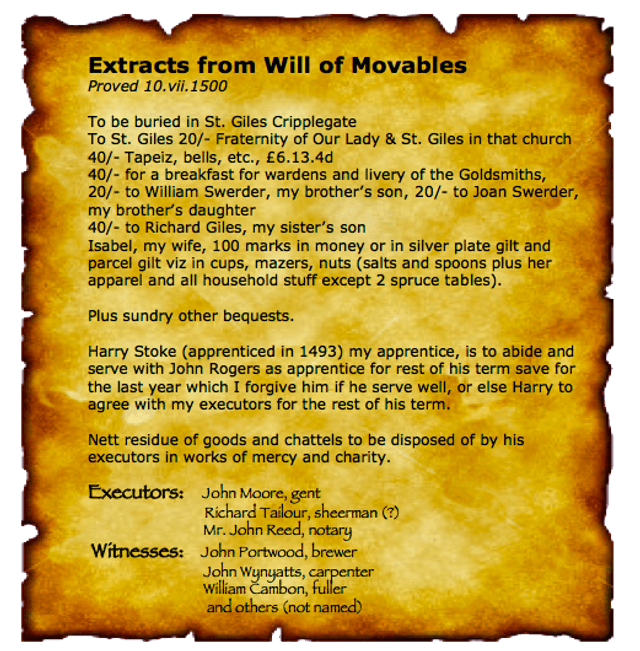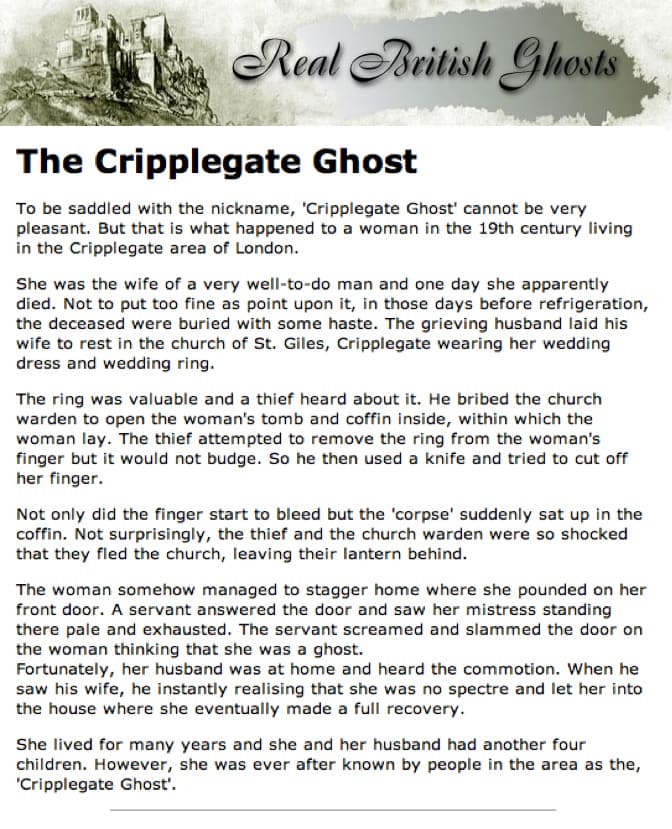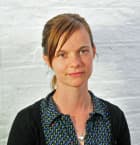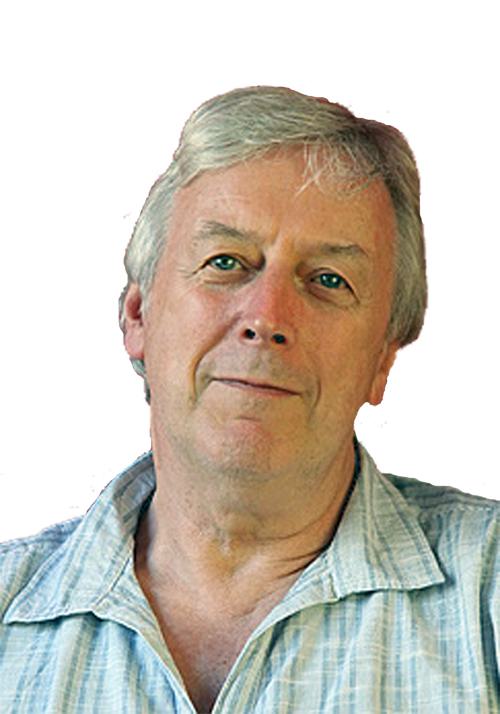Magic moments: The founding of Cripplegate Foundation and North London Cares
- Written by
- Aline Reed & Ken Burnett
- Added
- May 20, 2014
Fred’s haircut and John’s gift
Seemingly unconnected and five centuries apart, one of these led to the founding of North London Cares, the other to an invitation to an event that is sent each year to the donor’s family, 514 years later.
By Ken Burnett and Aline Reed
Cripplegate Foundation’s origins lie in gifts and donations made to the Church of St Giles Without Cripplegate for ‘the poor and needy’. The first of these gifts was recorded in the year 1500, for a certain Mr John Sworder. He gave £40.00. A nice gift even now, it was of course worth a massive amount more back then.
The parish of Cripplegate was named after one of the gates in the walls around the City of London and included the ancient manor of Finsbury. Today, the medieval church of St Giles stands in the heart of the modern Barbican Arts Centre and residential estate.
John Sworder made the first recorded gift in his will, dated 2nd April 1500. Many people followed John Sworder’s example, leaving legacies for education or to assist ‘the poor’.
Cripplegate Foundation was established in 1891 by a scheme made under the London Parochial Charities Act of 1883. This amalgamated all the charitable donations previously administered as separate trusts.
John Swerder (his name is always spelled in this form in these records) may have been second generation Dutch. He was apprenticed to Henry Boode, a ‘finer’, which means a refiner of precious metals, in 1449.He was made free of the company in 1456, became Renter Warden in 1470 and Warden in 1472 but does not appear to have been Master. There was a note that he refused to present one of his apprentices to the company and was fined, so perhaps he blotted his copybook.
In the succeeding centuries many pious men and women followed John Sworder’s example, leaving ‘benefactions’ for education or assisting the poor. In the 17th century the Foundation owned a couple of acres of good grazing in Knightsbridge and houses in Queen Anne’s Gate, plus land off Grosvenor Square, SW1.
Cripplegate Foundation was established in 1891 by a Charity Commission scheme made under the London Parochial Charities Act of 1883. It amalgamated all the non-ecclesiastical charitable donations previously administered as separate trusts.
The early governors of the Foundation built an institute on Golden Lane, containing reading and reference libraries, news and magazine rooms, classrooms, a theatre and even a rifle range. The theatre was used to celebrate MI5’s ‘good war’ in 1919. The institute was run until 1973, latterly as a secretarial college. It was then decided to close the institute and become a grant-giving trust.
Today Cripplegate Foundation has an endowment of £35 million, which has been built up since 1500. Its mission remains tackling poverty and inequality and it spends the income from the endowment mainly in the London borough of Islington, see here.
On 1st April 2008 the Foundation’s area of benefit was extended to cover the whole of Islington. The Foundation now claims to know every street in Islington and almost every voluntary organisation. It funds groups, identifies need and develops its own programmes to support Islington and where possible influences others to improve life chances in Islington. The Foundation’s latest research report Distant Neighbours shows how poverty and wealth live cheek by jowl and describes the actions the Foundation can take, with others, to remedy this.
Though 12 generations on from the original John Sworder, each year the Foundation holds a ‘Pious Donors’ event at the Church of St Giles and the Sworder family is always invited. Quite often, someone from the family accepts and comes, too. How’s that for consistent donor relationship development? A record, surely?
Philanthropy moves on – we hope - and in 2010 Cripplegate Foundation became one of the founding members of Islington Giving, which brings together trusts and foundations, residents and businesses to tackle stubborn issues of poverty and inequality in Islington. It asks local people to give what they can, be it time or money. Islington Giving has raised £3m since it started and recruited 1,000 volunteers for Islington. See Islington Giving’s site here. One of the charities that the foundation supports is a recent start-up called North London Cares.
Alex Smith, founder of North London Cares, tells the story of their magic founding moment
Four years ago I was a council candidate in Islington. I was doing my rounds on election day and knocked on a neighbour’s door. An elderly gentleman answered and we had a few moments’ small talk before I asked him whether he would consider coming out to vote for me.
His name is Fred and he told me he’d love to but that he was very frail on his feet and hadn’t been out of his house for three months. In the hallway behind Fred I’d spotted a wheelchair so I asked him if he’d like me to wheel him to the voting place so he could vote. He was happy to.
As I was wheeling Fred through the park he told me that, because his hair had grown so long and greasy in the time he’d been housebound, he felt he’d lost his dignity. He told me he’d become isolated from people around him. But, he said, it was great just to be out of the house on a sunny day.
As I wheeled Fred home after he’d voted, I asked whether he’d like me to take him for a haircut the next day. He’d made a real effort to come and vote for me so it was the least I could do.
The next day I returned to Fred’s home at the agreed time, helped him once again into his wheelchair and took him to our local hairdresser’s on Holloway Road. Coincidentally we’d both been going to the same barber for years, which helped us build trust with one another as we knew people in common.
I sat with Fred for 20 minutes while he had his haircut, before wheeling him back home through the park. It was another sunny day so we stopped for a chat. We talked about the outcome of the election (I lost) and I was inspired to learn that Fred had founded Escapade, a local fancy dress shop in Camden that everyone in our neighbourhood knew and where I used to go to buy joke sweets and bangers. Fred was proud of his shop and proud of the life he’d lived in cabaret on the cruise ships earlier in his life. But he was also a modest man who didn’t want to trouble people now that he’d become immobile. I found that a great shame.
Fred’s story and his predicament got me thinking. There must be thousands of older people in London who are isolated by circumstance; there must also be thousands of younger people like me who live nearby who could help them to lead fulfilling lives if it was made easy and accessible for them to do so. I wanted to harness the time and energy of young professionals in particular, as they felt like an underused resource to the voluntary sector; a demographic that many traditional community organisations either didn’t understand or couldn’t attract.


Over the next year I began planning what became North London Cares. Our plan was to speak the language of young professionals so we could mobilise them to support their older neighbours in a really accessible way. So we’ve built a community network – a pool of people who can participate in small chunks of time whenever they can, especially at evenings and weekends. To do that we harness social, digital and employment networks.
We also work proactively to identify isolation where it occurs - working with individuals, businesses, local authorities and community partners to offer our older neighbours an integrated programme of social, practical and emotional support holistically.
Less than three years later we’ve recruited a network of 700 volunteers working with 950 older neighbours. They’ve hosted 350 social clubs, created 25,000 new interactions and added 7,000 hours to the community, including 1,100 hours of one-to-one meetings. We’re now getting ready to start work in Lambeth and Southwark too, through South London Cares – and we hope we’ll be able to recruit as many volunteers there to help their older neighbours too.
Among others, North London Cares is now supported by Cripplegate Foundation and Islington Giving. Alex Smith’s story is a shining example of how one person’s seemingly small initiative to care for another can grow into something great. Great things are planned for the future too as, day in, day out, life gets better for hundreds of London residents, thanks in no small part to Fred’s haircut and Alex’s good deed.


